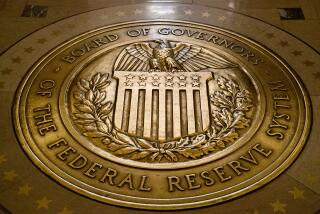Heller to Resign Fed Post; Pay Issue Cited
- Share via
WASHINGTON — Federal Reserve Gov. H. Robert Heller, complaining that Fed board members are underpaid, announced Wednesday that he will resign July 31.
Heller, 49, who came to Washington only three years ago from Bank of America, said that he will return to San Francisco to become an executive vice president at Visa International, the credit card company.
Heller, in an unusual display of candor, said that he would have stayed in the job if top government officials had received the 50% pay raise that Congress refused to approve for itself and other top federal employees.
“Financially, it gets tougher and tougher,” Heller told reporters at a luncheon. “I certainly wouldn’t go if pay wasn’t an issue.”
Fed governors currently earn $82,500 a year and their salary would have jumped to $125,000 if the pay raise had gone through. The Fed, which has a quasi-independent status inside the federal government, pays many of its regional officials and some top staff members more than its seven board members, whose salaries are set by Congress. Fed Chairman Alan Greenspan earns $89,500.
Heller, who noted that he accepted a substantial pay cut when he joined the Fed board, said that his new salary at Visa would be several times larger than his current income. He pointed out that he has two children who will be entering college over the next few years.
Pulling out his pay stub from the Fed, Heller even went so far as to tell reporters that his current biweekly take-home pay is $1,844. “Try sending a kid to Stanford or Harvard on that,” he said.
Following the Fed’s normal practice, Heller will no longer participate in monetary policy making and will not attend the next meeting of the Fed’s Open Market Committee on July 5-6 to avoid any inside knowledge of undisclosed Fed decisions.
President Bush is expected to move quickly to fill the vacancy on the Fed board. But Heller’s replacement is unlikely to significantly affect the balance of viewpoints on the Open Market Committee, which is sometimes split sharply between a number of regional bank officials who have generally supported a tight anti-inflation stance and the Washington-based governors, who have been more reluctant to push up interest rates.
More to Read
Inside the business of entertainment
The Wide Shot brings you news, analysis and insights on everything from streaming wars to production — and what it all means for the future.
You may occasionally receive promotional content from the Los Angeles Times.










